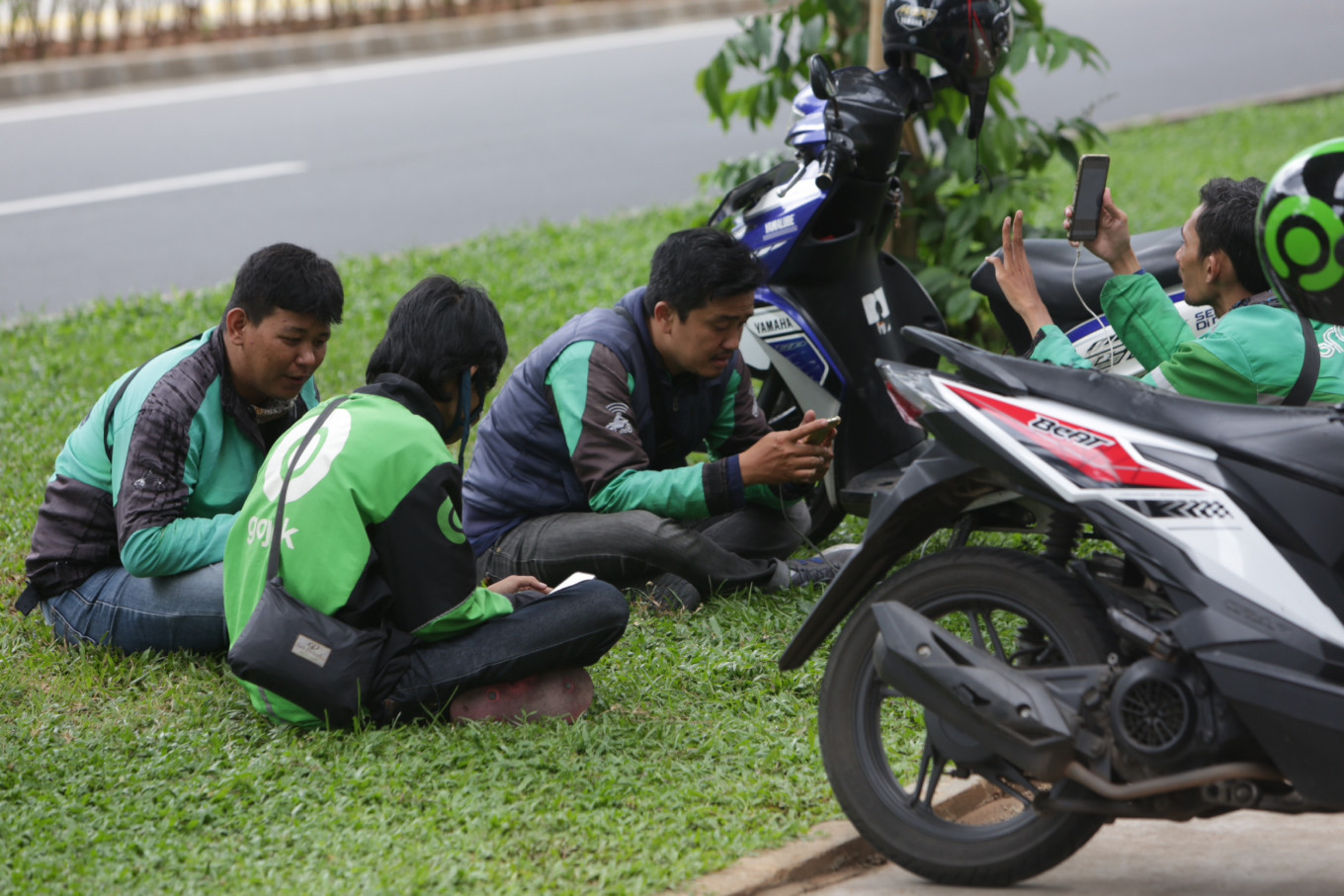Popular Reads
Top Results
Can't find what you're looking for?
View all search resultsPopular Reads
Top Results
Can't find what you're looking for?
View all search resultsGojek, Grab merger could spell start of antitrust investigation
Reports about a merger between homegrown Gojek and Singapore-based Grab have been circulating since SoftBank Group’s Masayoshi Son, a major backer for Grab, visited Indonesia in January.
Change text size
Gift Premium Articles
to Anyone
S
outheast Asian ride-hailing giants Gojek and Grab are reportedly discussing a merger deal, but officials and experts have warned that a consolidation of such dominant companies will cause a market monopoly.
A monopoly could result in price dumping, which could prevent new players from seeing a successful transition into the market or result in a single player having control over prices.
The Business Competition Supervisory Commission (KPPU) would evaluate any corporate actions based on their effect on market concentration and competition post-merger and acquisition, KPPU commissioner Guntur Saragih said on Thursday.
“Every corporate action can affect the market structure, especially mergers and acquisitions in the same horizontal,” he said. “If the Grab-Gojek merger were to happen, the commission would need a notification no later than 30 days after the merger is made effective.”
Indonesia only has a few ride-hailing companies, especially in the two-wheeler segment. Other than Gojek and Grab, which are valued at about US$10 billion and more than $15 billion respectively, Russia-based Maxim has operations in the country, having entered the scene in 2018. In the same year, Grab acquired American ride-hailing company Uber in Indonesia as the latter left the Southeast Asian market.
According to market data company Statista, Gojek dominated the market with 79 percent market share in 2018, followed by Grab with 14.7 percent and Uber with 6.11 percent.
In September of this year, another KPPU commissioner, Kurnia Toha, said the KPPU was still working on a post-merger notice system that required companies to notify the KPPU about a merger and acquisition deal.
“Technically, we can annul an M&A deal that could potentially harm the market, but this will also harm the companies involved. Therefore, the KPPU has never annulled any M&A,” he said at the time.
Reports about the potential merger between homegrown Gojek and Singapore-based Grab have been circulating since SoftBank Group’s Masayoshi Son, a major backer for Grab, visited Indonesia in January. However, neither company released an official statement regarding the matter.
A Grab spokesperson told The Jakarta Post on Thursday that the company “doesn’t comment on speculative news”. Meanwhile, Gojek has yet to respond to the Post inquiry at the time of writing.
Recently, Grab co-founder and CEO Anthony Tan told employees through an internal memo that the company had the ability to acquire its competitor.
“There is speculation again about a Gojek deal […] Our business momentum is good, and as with any market consolidation rumors, we are the ones in a position to acquire,” he said in the memo as reported by Reuters on Thursday.
Meanwhile, Gojek co-CEOs Kevin Aluwi and Andre Soelistyo wrote in a note to staff that the firm was “very capitalized” and had “no pressing reason” to do the merger as reported by the media.
“Our investor list is the envy of every other pre-IPO company in the world, with Google, Tencent, Facebook, Paypal and many others continuing to throw their weight behind us,” they said.
Indonesia’s online transportation market was already highly concentrated under the only two major players, Institute for the Development of Economics and Finance (Indef) research assistant Kimberly Tanos said.
“A merger between the two companies will have a potential for a market monopoly. That is why it is important to have an extensive study of this [merger] possibility by the KPPU,” she told the Post on Wednesday.
“If there is an indication of monopolistic practices, they may not get a green light from the KPPU.”
Amid fierce competition between the two companies, Kimberly said a merger would benefit them as they could share infrastructure, technology and lessen operational and marketing costs. However, the plan could have an adverse effect on consumers and driver-partners in the form of higher prices and limitations on driver numbers under a new platform.
“With less competition, prices for ride-hailing services could go up as there would only be one company controlling the market. For other consumers, they might revert to traditional ojek [motorcycle taxi] or use public transportation,” Kimberly said, adding that driver-partners might also be paid less since they would not have the choice of working for another company.
In a June 25 research note, Fitch Solutions wrote that a merger of the two companies, while viable from a commercial perspective, was unlikely to occur.
“While a merger would reduce competitive pressures and stem sustained cash burn from both companies, it would result in a single, dominant player across multiple service segments – a scenario which would likely entail antitrust scrutiny,” it wrote.
The recent e-Conomy SEA 2020 report by Google, Temasek and Bain & Co. projected that transportation and food delivery would be contracted this year to reach gross merchandise value of US$5 billion from $6 billion in 2019 due to the pandemic.
Despite the slowdown, Gojek recently announced that its core businesses had recorded an operational profit. Meanwhile, Grab recently launched its research and development center in Jakarta, making it the company’s Southeast Asia R&D hub.










